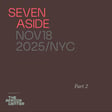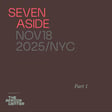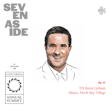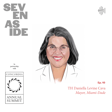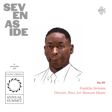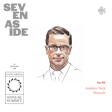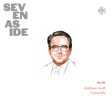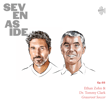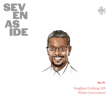Become a Creator today!Start creating today - Share your story with the world!
Start for free
00:00:00
00:00:01

Jeff Maurer
The I Might Be Wrong creator/publisher on the Substack experience and phenomenon of audience capture; this moment for political comedy, and nuances shaping the business and culture of comedy; where the Democrats and their platform go from here; and the odds on Herman Cain, posthumously, for Fed chair
Transcript
The Shifting Media Landscape and Rise of Comedy
00:00:11
Speaker
Hardly a day goes by without a journalist, entertainer, or pundit revving up a new sub-stack or podcast. And while the latest election cycle in the US was indeed a marker for our shapeshifting media paradigm, A powerful subplot that bubbled to the surface was that of comedy, comedians, and indeed political comedy. A space not long ago dominated by an elite handful, more often than not skewing left to center, politically speaking, is now an open, dynamic frontier occupied by upstarts and veterans alike that has taken the conversation and public opinion in dramatically different directions.
00:00:40
Speaker
Jeff Marr, creator of I Might Be Wrong on Substack, cut his teeth in stand-up comedy at the same time he was speechwriting for the Environmental Protection Agency, credentials seemingly on the button for HBO's Last Week Tonight with John Oliver, where, post-EPA, Marr spent six years as one of the show's original writers. A lifetime and late night, he explains. Incidentally, this is when we first scouted Marr playing for Last Week Tonight at Tribeca Film Festival's annual soccer tournament for the media and creative industry's New York Fest.
Jeff Marr's Journey from EPA to Comedy Writing
00:01:07
Speaker
Mars' range with, I might be wrong, which he began experimenting with in 2021, is as impressive as his volume of output, his commentary and satire sithing through economic and industrial policy, the healthcare system, geopolitics, sports, media culture, and social issues with depth, insight, and an establishment skewering middle ground clarity.
00:01:26
Speaker
detours into original storytelling, explainers on hot-button topics, but with jokes. Film reviews and a raft of guest columns by presidential hopeful Kamala Harris, late president Grover Cleveland, with the Coen brothers, and national public radio CEO Catherine Maher, to name a few notables, round out the proposition. Soccer too makes the occasional appearance. Maher, a lifelong fan, early on wrote about the game for the Washington
The Role of Political Comedy in Media
00:01:49
Speaker
Post.
00:01:49
Speaker
At such a crossroads for politics, comedy, the media, and indeed the game in America, we're privileged to get the lowdown from Jeff Moore about the sub-stack experience and the phenomenon of audience capture. Take stock at the moment for political comedy and the nuanced dynamics impacting the business and culture of comedy. Explore where the Democrats and their platform go from here, and handicap Herman Cain's posthumous odds for Fed share.
00:02:15
Speaker
Jeff, if you would, take us through your rather unorthodox and fascinating professional odyssey, if you would. I don't think one can fully absorb or appreciate this conversation without the Jeff Marr primer.
00:02:28
Speaker
ah it is It is an odd path. Thank you for choosing those descriptors. i think you What did you say? Odd and exciting or something like that. I i liked the words you used because um messy and ah unplanned would be other good ways to describe it. So I got out of school. I actually went into the Peace Corps for a while, was in the Peace Corps for a short time. There was a security thing, so we didn't stay the full two years.
00:02:56
Speaker
But I'm back in DC and I have no job and I basically ah submitting resumes all over town, um getting no nibbles. thinking, what do I do with my time I started doing standup comedy? So around that time, I'm 24, I start doing standup comedy. Soon after got hired at the EPA. Finally, someone fell for my shit and hired me. So I got hired at the EPA as a, I was a low level writer editor and that eventually turned into a speech writing job. And that's the job I ended up having for nine years. So for nine years, I was a speech writer during the day for the EPA and a standup comic at night.
00:03:32
Speaker
That led to me eventually getting hired at Last Week Tonight with John Oliver. I had met John through stand up. And when he left The Daily Show and got his own show, I was on a list of people who could submit a packet. And I submitted a packet and I got it. So that was 2014. I was on the the original staff at Last Week Tonight. And then I was at Last Week Tonight for six years. Six years is a long time and late night. There are people who are late night lifers.
00:04:01
Speaker
I had a had to wonder, do I want to be a late night lifer? You know, how happy am I at the show? What direction is the show going? I decided I had never written scripted TV. I really wanted to do scripted, you know, sitcoms, drama, stuff like that. So ah in between seasons, I made the big leap. And right when I made the big leap, Covid hit and all Hollywood shut down. And I thought, oh, no.
00:04:26
Speaker
What have I done here? ah So that, as it was for so many people, 2020 was a weird year for me of figuring out, now what, what do I do? And where that eventually led is to my substack, which is what I write now.
Substack: A Viable Platform for Political Comedy
00:04:40
Speaker
It's called, I Might Be Wrong, can be found at, I might be wrong.substack.com. And that's where I do all my stuff, political comedy. Sometimes soccer gets in there.
00:04:49
Speaker
It's mostly political comedy. Occasionally, very I don't want to overpromise, very rarely soccer. ah But i I'm doing that now. And to my surprise, that has become a legit job. i When people ask, what do you do? I look them in the eyes and I say, I write a blog. And they inevitably say, really? And I say, yeah, I know. It doesn't sound like a job, but it's a job. And that's how I got where I am. And that was 2021 that you joined Substack?
00:05:17
Speaker
I yeah, I started in 2021 and I started as a like an unpaid part time thing because I got hired soon after to write for a TV show. I finally it finally broke through. I got hired on a TV show on NBC. I wrote for that for a while. That show got canceled as most shows do. um And after that, I made the sub stack a full time thing. And so as as a publisher, as a as a podcaster,
00:05:42
Speaker
ah how has the sub-stack experience worked for you? What would have been the pinch points or moments of epiphany even? um I definitely realize how real audience capture can be. And I haven't had a bad experience with that. I've been lucky in that I don't think I've really suffered. I mean, I hope I haven't suffered from audience capture, but it's become very clear to me how it can happen, because you're dependent on your subscribers. That's where your revenue comes from. Especially in the political area, if you say something that pisses all your subscribers off, there they go, and there goes your revenue. That hasn't happened to me, but because the link between subscribers and money is so obvious, um I've started to really become aware that, oh, that could happen. And when people start to pander,
00:06:41
Speaker
like I get it. I understand why people just become culture warriors and you know bang on about the same issues over and over, usually in the most inflammatory way possible. It's because that leads to money leads to money. If I write about the estate tax, which is something i I might do because I have a background in economics,
00:07:02
Speaker
That post is not gonna go viral. If I write about Robin DiAngelo, that post is probably gonna go viral. People hate that lady. So I have come to understand how easy it can be to just slide into being a culture warrior, pick a point of view and then hammer that point of view as hard as you possibly can. That I think is the, it's not a guaranteed path, but probably the shortest and quickest path to big money. I try not to do that. I like to think I've not fallen victim to that.
00:07:31
Speaker
But boy, I see how it can happen. do Do you have an editorial calendar? Are you more opportunistic in your writing? Well, i the answer to any question about ah if I have any sort of organized process or theory or whether I know what I'm doing in any capacity whatsoever is always no. No, it's always basically by the seat of my pants. That's not entirely a bad thing because I'm trying to react to the news. The the the type of comedy I do
00:08:02
Speaker
I'm reacting to the news, right? the the The type of comedy I do, it's not anything I chose. It's just kind of what I fell backass words into. It's reacting to stuff. it's sort of ah It's a comedic take on the thing everyone's talking about, so you can't plan that very far in advance. like Yesterday, I wrote about the Hunter Biden pardon. I don't know when this is going to air, but we're recording this on Tuesday. On Monday, I wrote about the Hunter Biden pardon because that was the news, but um that happened what? Sunday?
00:08:34
Speaker
ah So, if I had something planned that something would have felt a little off topic. I prefer my stuff to be more on topic so sure sometimes I plan stuff farther out but a lot of time I'm just reacting to the news of that day. pandering just to just to zero in on that word for a second you' you've been Unsparing in your election postmortems and critiques of the left throughout the campaign cycle, both parties, but in particular the the left. There's been a ah drift in the wake of November 5th among some party leaders to the well-worn idea that Democrats lost touch with the working class and as a consequence need to do more to quote, meet the voters where they are. You, on the other hand, have been quite forceful on the point that for all of its weaknesses and missteps, the incumbent administration
00:09:25
Speaker
and this is with bipartisan support, mind you, has done more legislatively to target the working class labor movement and and in ah and American industrial and manufacturing primacy than perhaps any in recent memory. And this is a point in which, incidentally, we we agree. um Yet in the end, this hardly registered, much much less resonated with the electorate. This alone speaks to a ah serious deficiency in the Democratic brand that goes beyond ah a messaging pivot or or doubling down on economic populism. It's it's existential, in our view. from From where you stand, if a party can't get results like these to stick, what hope do they have in selling a ah vision four years from now? where Where does the Democratic Party go from here?
Jeff Marr's Political Identity and Critiques
00:10:11
Speaker
Yeah, here's my takeaway from all this. And for your listeners who who don't know what my views are and where I'm coming from, let let me just say that. I typically, when people say, what are you politically? I say Obama Democrat. That's a two word phrase that I think pretty well captures it. um Obviously there's nuance there, which would be very boring. And so let's not do that. But that's basically where I'm at. I'm basically like a normie liberal. You're right that I've written a lot about the left. That's because I think the debates that are happening on the left right now are interesting. i don't I don't know how many more articles I can write that kind of say, boy, the Republican Party, is weird stuff going on over there. I've certainly written there in that article when I was working for John Oliver. I wrote it as a TV piece. I don't know how many times I can say that. So the left has the more interesting discussions
00:11:03
Speaker
at this moment and those are the discussions I like to jump into and you're right that one of the ones right now is okay we lost now what you are right that A lot of the economic populous people, you could call them the Bernie people because they typically are, are saying as they so often do, and I'm going to try to i'm going to try to present this argument fairly. I'm going to turn out to sneer at it. They're saying, we but look, where we're losing the working class. That part's true.
00:11:34
Speaker
We need to pivot more towards yeah economic populism, for lack of a better term. And you are right that the point that I have made in response to that argument is, didn't we just do that? Because if you look at things the Biden administration did, many of which I supported, not all, but many of which I supported, it was very much oriented towards the working class. And a lot of it worked. if It was actually, it's been a very good last couple of years for the working class. If you look at ah median incomes for, you know, break it down any way you want. ah Median American, bottom 20%, the numbers are pretty unambiguous.
00:12:16
Speaker
Wages have been good. Wages have gone up. And I'm talking about real real wages so adjusted for inflation. We did it. It more or less worked. You're right that the effects of that in terms of winning votes for the Democrats seems to have been you know little to nothing. Here's what I've concluded from that. And I wrote an article about this. So you know you can look it up at my sub stack. I might be wrong.substack.com. My feeling after all this is that Voters do care about economics. Some people say, oh, this election was all about social issues. I don't agree with that. I think social issues were clearly very important, but economics were definitely in the mix, too. Voters care about economics, but they don't care about any specific policies. There's no policy agenda they back. And, you know, in the article, I unpack why there is some evidence for this. This is not just, you know, my horse sense. There's some good evidence to suggest they don't support any specific policies. Let's be honest.
00:13:14
Speaker
A lot of voters don't even know what policies the administration passed. you know Ask your average voter about the CHIPS Act. They're not going to have a strong opinion on it. They don't care about the policies. They only care about the outcomes. The way I put it in the article is, it ah fuck I asked before if I could swear, so here it comes. get They want the pilot to land the fucking plane, get it on the ground wheels first. That's all they care about. They want high growth.
00:13:40
Speaker
low inflation and into low unemployment. Those I think are reasonable things to want. That's what they want. High growth, low inflation, low unemployment. They want all three. They don't want two of the three, which is what the Biden administration delivered. Deliver those three things. They're going to be happy with your economic performance. Don't deliver them. They're going to be unhappy.
00:13:59
Speaker
But that's how they look at it. It's not, oh, you should have done these policies, not those. If they cared about policies, then they wouldn't have elected the guy who has the most inflationary agenda of any presidential candidate I can think of. Inflation was clearly a major concern for voters. Trump, if you look at what he wants to do on debt, tariffs, the Federal Reserve, he is inflation in a can. So if policies were what they cared about, they wouldn't have elected that guy.
00:14:29
Speaker
But they did. And I think that supports my point that they care about the outcomes,
Voter Expectations and Economic Outcomes
00:14:34
Speaker
but not the specific policies. And let me add one more thing. The obvious implication of that is that when the economic populist folks, you could say the Bernie folks say, this shows that voters are chomping at the bit for our economic agenda. My response is no, no, it does not. They're actually not calling for any economic agenda, including yours.
00:14:57
Speaker
Well, the Trump administration will undoubtedly take credit for the gains in groundwork from these last few years. So how do the Democrats counter that without pandering? Oh, I don't know. I mean, I i don't know. I struggled to plan one week in the future. So four years in the future, I don't know what the situation will be.
00:15:18
Speaker
It remains to be seen if Trump is going to be able to do any of the economic stuff that he wants to do. you know He makes a lot of noises, but those noises often ah signify nothing. The tariff stuff, look, he should have to go through Congress for that. The stuff about the Federal Reserve, you know he wants the Federal Reserve to be less independent. That sounds like the type of Trump thing that he might just forget about. He might just forget to do, or he'll like, you know, I don't know, he'll nominate some clown to some Fed chair. And then as he tried to do with Herman Cain, people forget that he tried to nominate Herman Cain to a Fed chair. He might try again, even though Herman Cain is now dead. But why should that stop him?
00:16:08
Speaker
ah So, yeah, he'll probably try to do something nutty there, but I don't think he has strongly held opinions, so he might just give up. So, I don't even know what he's going to be able to do. yeah you know The budget picture, we're going to have this big fight about ah you know the budget picture because the Trump tax cuts expire next year. I don't know how that's going to shake out. So, I don't even know what the policies are going to be, and I don't know what the economic situation is going to be.
00:16:30
Speaker
if ah Trump did all the stuff that he said during the campaign he wants to do. I think the results of that would be very bad, right even acknowledging that you know the president, of course, doesn't control the economy. He is one factor in a very large system. Nonetheless, if he actually did the stuff he wanted it to do,
00:16:53
Speaker
you know 20% across the board tariffs. Yeah, that'd be real bad. What will probably happen is that the adults in the room will say, no, you idiot, you can't do that. It won't happen. And then you're right. And then the economy movie will be pretty good. And he'll go, I did that. And inflation, of course, is now it was up. It is back to where it should be. um Yeah, he'll probably get credit for that, even though that happened before he took hours. Yeah.
00:17:21
Speaker
I don't know. Like I said, I think voters just kind of know how conditions are, but they don't know how conditions came to be that way. So there is a lot of, yeah, right place, right time. People think that you did it. Well, then of course there's this notion of meeting people where they are instead of asking voters to meet policymakers at least partway. That'd be nice. It'd be nice if they knew what the policymaker did, you know? It's like,
00:17:52
Speaker
people People, a lot of, we and we know this from you know exit polls and stuff, a lot of people ah remember COVID hitting during the Biden administration, which of course it did not. It hit during the Trump administration and then Biden took over. But yes, knowing the facts would be a nice place to start. I don't know how to make that happen though.
00:18:12
Speaker
All right. Well, we'll come back to that in a minute. But you you've written considerably about political comedy. And and and while this was indeed the podcast and sub stack election, comedy and comedians, for that matter, were major subplots. You've said, quote, opinions are easy. Jokes are hard. What do you make of this bumper moment for political comedy and the commentary comedy spectrum you've identified? Is it the best of times, worst of times?
00:18:39
Speaker
It's one of those. it's the i'd I'd argue pretty hard for the worst of times. i I guess this a lot. I don't know how to, it's like I don't want to be the the bitter old man where I'm like, ah, it's not like it was. ah the And i I can probably avoid being the bitter old man by openly admitting that there probably was no golden age of political comedy. If there was a golden age, it certainly wasn't you know when I was working in the mid to late 2010s. So maybe that's a more reasonable place to start is just to say, look, it was always a mixed bag. It was always a mixed bag. There was always good stuff and bad stuff. Look, I was a huge fan of The Daily Show in the 2000s and then into the 2010s. And like I think they did some really good stuff. Colbert Report around that time was really, really good. um So yeah, there's always
00:19:34
Speaker
Good stuff and then less good stuff. So let's say that it remains the same, which I think is an accurate statement. There's still good stuff out there. There's still not good stuff out there. It is as it always was. um The comment about being easy and jokes being hard. It is true that especially during Trump's first term, there was a lot of claptor in comedy.
00:20:03
Speaker
Claptor is a phrase that I've heard Seth Meyers maybe came up with, it although I've also heard Tina Fey maybe came, I don't know. It came came up around, the you know, the late 2000s, early 2010s to describe this phenomenon of a comedian saying something that wasn't funny, but something that people agreed with. So the crowd doesn't laugh, but they will clap because they agree with you. And I, as a standup and late night comedy writer in the 2010s during the Trump era, witnessed claptor really having a heyday. And I won't pretend that I was you know innocent of this crime. I wasn't. But it really kind of ah kind of took over, you could argue. Certainly on um John Oliver, we were always you know sort of took it cooking with two ingredients, the political stuff and the humor. And maybe sometimes we were doing too much of the first and
00:21:01
Speaker
too little of a second, I don't know, that's debatable. ah Certainly, yeah and I'm still doing it. I'm still writing political comedy and it's still those two ingredients. The mix, you know, how much politics, how much comedy, that's tough to determine what the right thing is. I do think like both ingredients should be good. If you're making a sandwich with meat and cheese, if the meat's good and the cheese is good, probably the sandwich will be good. And if they aren't, then probably the sandwich will not be good. The political stuff, hopefully,
00:21:31
Speaker
when you're doing it, it's insightful and not, you know, reheated Twitter opinions. And the jokes also should be good. I do think there were times, you know, and let's not name names, but certainly there are times when one or both ingredients is bad. And um I think one thing people kind of figured out, especially during Trump's first term, is that if your takes are not insightful and bland and sometimes even maybe misleading and they distort reality, that can be okay in your audience's eyes as long as they are correct. If you are giving them the correct opinions as as defined by a particular political viewpoint, they will decide, well, I still like this, I'm still gonna watch. And that is the formula that some people are going with these days. And do you think that's predominant and in late night? i mean
00:22:30
Speaker
has late night any hope, but has that genre any hope for a revival or is it pretty much lost to time? I'm sorry to say I think it's pretty much lost to time. And that breaks my heart because I am a big late night fan. And and I mean, I'm a big late night fan. I so i was born in 1980. So right when the whole like Carson Tilleno, but then like Conan's popping up and Letterman's going to CBS. All that was happening right when I was old enough to stay up late and watch that. so I started watching that and then by the time I was a teenager, I was watching Letterman, Conan, and then The Daily Show every single night.
Challenges of Late Night TV in the Streaming Era
00:23:07
Speaker
and you know I would tape them if I couldn't watch them. so I love the genre. It was a huge part of my life.
00:23:13
Speaker
that genre has gigantic problems, which extend far beyond any issues about the quality of political comedy that's happening on these shows, right? It's it's just broader factors. you know Fallon is not political at all. They're still subject to this. The non-political shows are are dealing with the same thing the political shows are, which is that Network TV is slowly dying. It's all going to streaming. Cable TV is quickly dying. It's all going to streaming. That's just the, ah you know, situation being driven by technology, not by any trends in our politics that everyone is trying to deal with. And this genre, which I love, but which I also know it's kind of filler. That's what late night TV kind of was. If you if you look at like, and I'm, because I love this stuff,
00:24:06
Speaker
I've read like Johnny Carson's biography and all the Bill Carter books about the history of late night. The Evolution of the Tonight Show, in the 60s, 70s, the question is, how do we fill this time cheaply? right We want to put something on TV that's not a test pattern, and but we can't spend much money on it.
00:24:27
Speaker
or otherwise the economics of it just don't work. How do we fill originally it was 90 minutes. The Tonight Show used to be an hour and a half. How do we fill 90 minutes for like super cheap? And the answer was, all right, you pay one host, but he doesn't go anywhere. He doesn't do anything. He's in the same studio all the time. And he just talks to celebrities. He he brings in celebrities and talks to them. It's that that's just kind of filler. The comedy, you'd get five, 10 minutes. Well, like I guess counting the monologue 10 to 15 minutes of comedy a night.
00:24:56
Speaker
which is a lot to produce. And then the rest is bands and comedians and interviews and filler. And unfortunately, I feel like that format just doesn't translate well to streaming. And I said, I just said, I feel like it doesn't translate to streaming. i Everyone agrees it doesn't translate to streaming. they've been There have been attempts to make it translate to streaming. They have not worked.
00:25:21
Speaker
And um it's just, it's hard to picture that genre making the jump. So I think, unfortunately, the field is in for a contraction where I would guess 10 years from now, there's gonna be one, maybe two, possibly three late night shows, but that's about all there's room for, I think. um The other dynamic I wanted to touch on that is yeah that the popular notion of blurred lines between comedy and and journalism, which of course, ah your alma mater last week tonight took to a a new level. um It doesn't often hit on something that Bill Maher in particular likes to talk about. And that's the shoe leather, whether you're a reporter or ah or a standup that gets burned and the and the perspective gained from being out in the field, on the ground, face to face with the public. and You mentioned that you were a writer for the EPA at the same time you were doing standup. How did one world inform the other? What of that perspective risks getting lost in a more social media driven comedy marketplace? That's a good question. um
00:26:22
Speaker
I'm not sure and not sure me being a speechwriter for the EPA informed my standup a ton. I think most of the overlap was that it's just's writing. Both jobs are a form of writing. um It's certainly true that even though I ended up writing political comedy you know as a job, my standup wasn't very political. It's hard to do political standup.
00:26:49
Speaker
because you start talking about politics and immediately half the audience says, okay, I don't follow politics, I'm out. And then if you express any identifiable viewpoint, the half that was still paying attention, half of them say, well, I disagree and I'm out. So my standup was never very political. um Yeah, I honestly, I think the honest answer to your question is,
00:27:12
Speaker
It probably didn't really matter that I happened to be writing for the EPA at that point. If I had been working for an insurance company or a teacher or any other number of jobs, my stand up probably would have been about the same. Was flipping the equation, um was the the experience of doing stand up in person um in these? It's not ah it's not a sexy gig. Is a nice way to put it, yeah.
00:27:37
Speaker
much like man mean Much like reporting, and especially on the ah you know on the campaign beats, um was having those interactions, ah those in-person, face-to-face interactions, did that shape you as somebody who wrote policy? God, yes. God, yes. Absolutely. and you know i write policy I don't think I write policy. but it um yeah Which was at EPA, I was not writing policy, I was writing speeches. Right now, I'm sure as hell not. My God, if sub-stack writers wrote policy, what a horrible system that would be. But I am writing about politics and and absolutely it informed my opinions and my view of the world ah because you're right, it's not a sexy gig. You take, or at least I took any gig if anyone would give me for five more years
00:28:30
Speaker
It didn't matter wherever, whenever. You know, I played an ice cream parlor. I played an open air festival in Frederick, Maryland. I played a country club in Amish country. I did anything like I, I had a little Hyundai and I would drive that Hyundai anywhere in the mid Atlantic for peanuts. So you go everywhere and do all types of shows. And the first thing it does is you do realize, oh, the whole world isn't Brooklyn.
00:29:03
Speaker
And ah because I did eventually move to New York and a lot of the shows are in Brooklyn and there are these very hip shows. These are the shows, by the way, where once Trump came on the scene, you could just go, man, Trump, what's that about? And the crowd would go, whoa, you got to understand that the whole country isn't that. And there is um it's it's a weird form of like issue polling when you go on the road and ah you do jokes and you find out that, oh, people are really identifying with this premise, but they're not identifying with that premise. um it's It's kind of polling a little bit, not very scientific, but it has that effect. And um yeah, it definitely helped me, yeah, get a sense of where people are at. And, you know, I still remember some of those experiences and
00:29:58
Speaker
ah they They shape my view of the world. I'll also say that ah a shift in comedy that most people don't know about, you only kind of know about it if you're neck deep in it, is that you know I come from stand up. There used to be basically three ways into comedy, stand up, sketch, and improv. I came through stand up. That used to be very common. When I got hired at Last Week Tonight in 2014, I think three of the eight of us came through stand up. And then John also came through stand up. So counting John, four of nine.
00:30:28
Speaker
um That seems really rare these days. It's it's improv. It's overwhelmingly improv. Sketch has stayed about steady, but it's overwhelmingly improv. And then now there's also the way in where it's you know TikTok or Twitter or something like that. But standups have become kind of thin on the ground, which is weird because I feel like standup is kind of the beer track and improv is kind of the wine track. So if You at home are watching comedy and thinking, boy, the sensibilities of this comedy seem to be, you know, pretty, pretty wine track, for lack of a better phrase.
00:31:09
Speaker
That might be because the writing staff is now 80% improv, 10% stand up, 10% sketch. Whereas back in the day, it would have been 50% stand up, 25 improv, 25 sketch like that. it's ah It's a very, you just get fewer beer track people. And I'm, by the way, I'm in the middle. I sort of don't fit any category well, but I'm certainly more beer track than some of the people who come through improv. That's for sure.
00:31:39
Speaker
And so, yeah, that's a big change that I do think has had a major impact, but very few people know about. Well, you you had cited, John, you've mentioned The Daily Show earlier and you cite as an early influence, a big influence, John Stewart, who just, of course, signed on to another year at The Daily Show. You were less than. Wait, wait hang on. I missed that news. see He signed on to another year. Yeah. Interesting. Just just Mondays or every night of the week? Just Mondays and and the the show and and his his podcast. OK, interesting. OK, well, you're breaking news to me. I hadn't read that.
00:32:09
Speaker
So through to through to December of next year. So um well, that like that leads me to my next question. you You were less than bullish on his return to the anchor desk post to Apple TV earlier this year. Have you at all come around on him? ah Well, I don't. Was I less than bullish? I don't know. That Apple show was something. Let's leave it there. Was a. Yeah, I um but Less than bullish is probably fair. i didn't I didn't quite know what he was going to do. Again, the Apple show was what it was, and I didn't know where he was at. I i don't watch him every Monday. I've watched some clips, and yeah, the clips have been... um I've enjoyed some of them. Some are better than others. its It's a mixed bag, as it always was. I still know some people at The Daily Show. They've got some talent over there. There's some talent on that team.
00:33:03
Speaker
If you plug John Stewart into that team, well, I guess I'm not too surprised that the results are better. um I don't know. I haven't been watching every Monday. Maybe I should start. I certainly loved him back in the day, and my God, I must have seen every episode between 2002 and 2012.
00:33:21
Speaker
So ah it makes sense to me that he signed up for another year because I did get the sense that those Mondays were ah working for The Daily Show. So I'm not surprised I want to keep that going.
00:33:35
Speaker
yeah I think the premise of your of your post was, um or the the headline at least, was John Stewart can't go home. um yeah In a nutshell, that he couldn't necessarily recapture the the magic or the sensibility that made him so successful in the ah you know during the the initial run and tenure. You're right. That was the headline. um i i wonder you're you're right I should revisit that article because you're right. When he went back to The Daily Show,
00:34:01
Speaker
I did argue that he couldn't recapture the magic. I'll tell you one thing that's blunting my opinion, though, is I no longer have TV ratings for this show because TV ratings used to be public. They used to be published by this site, Show Buzz Daily. You could anyone could go and see them. Show Buzz Daily said that's not worth it anymore for us. We're stopping. So now I'm blind and I actually don't know the ratings for his Mondays. I wish that I did because, yeah, you're right. Maybe that article deserves being revisited.
00:34:31
Speaker
The high points of your tenure with John Oliver undoubtedly include the Tribeca Film Festival soccer tournament that helped inspire this very publication. You you and soccer go a way back, as you as you referenced earlier. You wrote about the game for the Washington Post, and soccer was an organizing principle, if I might be wrong. When you think about then versus today, in terms of the game, what about its growth in the United States strikes or excites or even dismays you most?
00:34:59
Speaker
Well, it's all excites. ah Very few things are bad news in the world of US soccer these days. I think a lot of it is good news. I mean, I'm old enough to remember when yeah MLS was around you to kind of cross your fingers and hope MLS would be around again next year. you know There have been so many failed attempts, had been, so many failed attempts at getting soccer to stick.
00:35:24
Speaker
in the United States. you know Even Pele and Beckenbauer couldn't get soccer to stick in the United States back in the day. um Just having an established league was a a big deal back when, even if it was 10 teams and eight of them made the playoffs.
00:35:40
Speaker
Now you're at, what are are we about to be at 30 MLS teams next year? I mean, they expand almost every single year. Finally, there's a national footprint. The teams are not going anywhere. I actually live near Audi Field in Washington, DC. My team, DC United, finally has a stadium of our own. Most of the teams have stadiums of their own. And most importantly, they have academies. And the academies are the part that I'm really excited about because I'm a big national team fan.
00:36:10
Speaker
And back in the day, when someone would ask, you know, what's it going to take for US soccer to reach the next
Growth of US Soccer and Future Prospects
00:36:19
Speaker
level? You know, we're a country of 330 million. We should be better at this, right? Even if we, unlike many other countries, have other popular sports competing for top athletes, there's still 330 million of us. So you'd think the team would be pretty good. Well, the obvious problem was we weren't doing a good job of finding and identifying talent and if you had a kid who was good at soccer, 12, 13, 14 years old, was he going to develop? you know maybe He might have been in a situation where you had to pay for a travel team and maybe his family can afford that, but maybe they can't.
00:36:59
Speaker
Maybe he decides it's just not worth it. Maybe he's you know in high school and is like, well, I don't know, the cool kids play on the baseball teams. I'm going to play on the baseball team or whatever. Now a kid with talent is likely if he's in one of these 30 cities, or I guess it's 28 because of New York and LA.
00:37:14
Speaker
But if he's in one of those places, there's a good chance he's going to get found by the Academy, as guys like Weston McKinney and Tyler Adams were. And he's going to keep playing soccer and play it at a high level. And that's exciting because we are finally going to get our ah good soccer players in an environment where they can learn and get better and be in highly competitive environments. And I think that's how you tap into the potential of this gigantic country. So that's exciting from a national team point of view. I love that MLS is healthy. NWSL is like
00:37:54
Speaker
They've got their feet under them now. Yeah, that's exciting, too. of It is a legit business in the U.S. these days. I don't think it's going anywhere. So that's all outstanding news from my point of view. Well, as as this country and its North American partners yeah gear up to welcome the world in twenty twenty six, is there something poetic about the incoming administration presiding over an event of of this spirit? One that's Actually one that's so committed on on the surface to promoting liberal and progressive values.
00:38:30
Speaker
ah The honest answer is it bums me out and to think of, ah yeah, we're going to be on the world stage and um whatever the president's involvement and all that pageantry and stuff is, you know, I personally consider him a pretty big embarrassment. Other people have different different opinions, but um I'm not super proud.
00:38:54
Speaker
when the moment it comes where we say, and now a few words from our leader. And he's like, Rosie O'Donnell is a fat piece of shit. Like, well, well, that's not the Gettysburg Address. But it's what we have. Yeah, I wish we had gone a different way, but we didn't. So World Cup's not about the president. World Cup's about soccer. You know, if he if he gives a dumb speech and we make the semifinal, I'm going to call that a win. And one of those things is like guaranteed to happen. So.
00:39:24
Speaker
I'd like to bring it back to Substack. And and and and number one, you know one of the things that's impressed us most about the platform is for sure it's staying power. But moreover, that it's a market driven rebuttal to social media. ah yeah ah A true marketplace of ideas in contrast to what's social media is a race to the bottom free for all.
00:39:45
Speaker
Is it a stretch to see sub stack as a model in your experience, um, for a new, healthier middle ground consensus in, in, in media terms? I don't know if it's, um, if we can count on sub stack to reflect any particular political orientation. If you look at who's big on Substack, man, they're from everywhere. I mean, you do have the normie liberals like myself and Matt Iglesias and Noah Smith. um You've got some really far left people, Sean King. ah Some farther right people are are successful. helen cox richard schn ah Helen Cox Richardson is one of the big writers and she is sort of a like NPR type
00:40:38
Speaker
news person, um I don't think there's any particular political orientation um on Substack. It seems to be from all over. I will say that much like soccer in the US, Substack really seems to have their feet under them. I'm on Substack. It's my entire livelihood. I feel confident that this thing is not going anywhere, which, you know, I didn't move to Substack with any grand plan of how this is going to become my job and I was going to build a publication all of my own. I did it because I was out of work and I was actually renovating houses at that moment. One thing I left out of my biography is I come from a construction family. So construction work is like my fail safe. So I was doing that and going, it's weird that I was a writer for 20 years and now I'm just not. So I started writing again and it works. It's it's it's viable. Substack is a place where people who,
00:41:37
Speaker
have never heard of you, can find you. And um you know half my stuff is free. Half my stuff is behind the paywall. So people who have no clue who I am, which is 99.9999% of America, they can read my stuff for free for a while, see if they like it. And then if they are tired of getting half the stuff and want to get all the stuff, they can subscribe. That seems to work, to my surprise.
00:42:04
Speaker
people will find you that way. I've grown, the Substack is growing. It's all through just like people sharing it and people finding me through Substack's recommendations feature. And um that does seem like a viable model. It does seem to also cover all sorts of ideas. I i don't think it i don't think it's really doing what social media is doing because you're right, Facebook has kind of a bit of a, it's got a bit of a right wing character. you know It's sort of for older people and Facebook's a little to the right and TikTok is definitely to the left. um Twitter and Twitter's in this weird transition period because of Elon. Blue Sky is definitely left. They do have characters, the social media platforms, don't they? The Substack kind of doesn't. ah Take that for what you will. I don't think it's I don't think it'd be accurate to say it's centrist because it's kind of not, but it's kind of all of them. Well, yeah it there's a beauty in that it contains multitudes.
00:43:03
Speaker
where does where Where do things, I mean, you you you have you you don't have ah a ah ah game plan, so to speak, um but you're you're verging, I mean, you just marked another anniversary, if I'm not mistaken. So congratulations are in order first and foremost. Thank you. Where where do you see it going from here? Are are you hoping to write more for for television? um And and you know ah is is soccer also do a comeback and in your coverage as as World Cup approaches?
00:43:30
Speaker
I would would love to have soccer be a bigger part of the block. We are going to have a World Cup in the US in a year and a half. So yeah, I'll certainly do something about that. I mean, how how can you not? Even though we don't have any games in DC, which is unbelievable. But um yeah, it I'll do something about the World Cup. As for where things go from here, from my substack, I'm still growing. and um i Like I said, i I can't believe it worked. It wasn't a plan, but it has worked. It's still growing. I haven't hit a plateau yet. um What's fantastic about where I am now is that I don't have to take some shitty TV job. You asked when I go back to TV. I don't know. Never say never about anything. If I got the right offer, I would. I did. I do like writing for TV. I love being in a writer's room. That's the part I really miss. I love being in a writer's room.
00:44:27
Speaker
when I was writing for that show on NBC, American Auto, which was a funny show, even though it didn't stick around. I loved being back in the writer's room. It was a lot of fun. So maybe, you never know, but I don't have to take anything shitty anymore.
00:44:41
Speaker
I don't even want to tell you what shows I was in the mix for in those dark days of 2020 and 2021 where like if I had gotten an offer, I probably would have taken it even though I had no faith what show whatsoever in the show on any level, you know, artistically, ah commercially, I just had no belief at all that they were going to work. And by the way, we're a couple of years later now and I was right in every single case. I was like, that is a ticket on the Titanic and I was right every single time. I would have taken those back then. ah But now the sub-stack is successful enough that I only have to take something of if it's a good offer. So I'm not going to take a crappy offer. If I ever go back to TV,
00:45:28
Speaker
Which I don't have to, I'm very happy doing what I'm doing now. I'll go back to TV if I get a real good offer. If something that really makes me think, oh, that's, I do love being in a writer's room and that's you know creatively something that could be a lot of fun, then maybe. But it's nice to not be in that desperate place anymore.
00:45:50
Speaker
I might be wrong can be found at, I might be wrong, and that's all one word, dot .substack dot.com. Signing off for Seven Aside and Kit Magazine with special thanks to this episode's guest, Jeff Marr. I'm Evan Howell.
